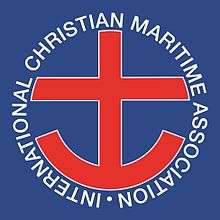International Christian Maritime Association

The International Christian Maritime Association (ICMA) is an ecumenical association of 28 Christian organisations, representing different churches and Christian communities. The members are all non-profit making organisations actively engaged in welfare work for people who work at sea, seafarers and fishers and their families. The Association is registered as a charity in the UK and, through its members, operates internationally.
ICMA was founded in 1969.[1] It seeks to encourage ecumenical collaboration and mutual assistance between these different organisations at international, national and individual port levels. The ICMA members' chaplains are obliged to serve seafarers, fishermen and their dependants regardless of their nationality, religion, culture, language, gender or race, in accordance with the Association's Code of Conduct.
Activities
The International Christian Maritime Association is the professional association for port chaplaincy. It sets the standards for chaplains' education and training, accrediting courses and soliciting funds for course delivery.
The International Christian Maritime Association considers itself an enabling network, strengthening partnerships among members and across denominations to provide a continuum of care for seafarers who move from port to port. This is achieved by regional and global meetings and conferences, a reliable network directory, effective communication systems and sound ecumenical relations.
ICMA members employ more than 1,000 port chaplains and many more volunteer personnel, and maintain more than 500 seafarers' centres and other shore-based welfare facilities and services in almost all international sea- and river ports. Its members specialise in providing face-to-face frontline pastoral care to seafarers, fishers and families in ports, on board and at home.
The Association works in partnership with other organisations that have the wellbeing of seafarers at heart, offering access to our members' frontline providers of welfare and the seafarers they meet.[2]
The Association's ministry of advocacy for seafarers rights and justice is achieved by participating in the United Nations' International Labour Organization (ILO) and the International Maritime Organization (IMO). ICMA contributed to the formulation and ratification of the Maritime Labour Convention, MLC2006. The ICMA network provides legal advice for chaplains who support seafarers. The Mission to Seafarers has a Justice desk in London and the Seamen's Church Institute of New York and New Jersey (SCI) runs the Center for Seafarers Rights (CSR) from its base in New Jersey. In addition, ICMA contributes to and uses the services of the Seafarers Rights International (SRI).
ICMA collaborates in social partnership with the industry to promote the dignity and welfare of seafarers. ICMA members cooperate locally with unions and representatives of the International Transport Workers' Federation (ITF), shipping companies, agents and governments.
ICMA is part of the International Committee for Seafarers Welfare (ICSW) and the Maritime Piracy Humanitarian Response Programme (MPHRP). ICMA works with SeafarerHelp to give seafarers' easy access to care, and has ties with the International Maritime Health Association (IMHA) to promote seafarers' health.
The Association and its members, all charities, have been generously supported by the ITF Seafarers' Trust and The TK Foundation. These institutions have supported the establishment and maintenance of facilities and services for seafarers provided by the Association and its members, including seafarers centres, transport for seafarers, communication technologies for seafarers' use, and conferencing and training for port chaplains and centre staff.
The International Christian Maritime Association has a Secretariat based in the United Kingdom.
Member organisations
- Apostleship of the Sea / Stella Maris (Roman Catholic)
- Association for Seamen's Missions (Japan)
- Biblia Harbour Mission (South Africa)
- Christian Seaman's Organisation (South Africa)
- Church of Sweden Abroad (Svenska kyrkan i utlandet, Sweden)
- Danish Seamen's and Overseas Church (Danske Sǿmands- og Udlandskirker, Denmark)
- Finnish Seamen's Church (Suomen Merimieskirkko, Finland)
- German Seamen's Mission (Deutsche Seemannsmission e.V., Germany)
- Indenlandsk Sømandsmission (Denmark)
- Indonesian Ministry to Seafarers
- Korean International Maritime Mission
- LIFE International Seafarers Christian Missions (Romania)
- Mersey Mission to Seafarers (Liverpool, England)
- Nederlandse Zeemanscentrale (Netherlands)
- North American Maritime Ministry Association
- Norwegian Church Abroad (Sjømannskirken, Norway)
- PCT Seamen's/Fishermen's Service Centre (associate member)
- Queen Victoria Seamen's Rest (Methodist, London)
- Royal National Mission to Deep Sea Fishers (UK)
- Sailors' Society (Protestant)
- Seafarers' Welfare Board for New Zealand
- Seamen's Christian Friend Society (United Kingdom)
- Seamen's Church Institute of New York and New Jersey (Episcopal Seafarers' Advocacy founded in 1834)
- Seamen's Church in Sweden (Sjömanskyrkan i Sverige, Sweden)
- Seamen's Mission of Estonia
- Seemannsmission der Nordkirche (Germany)
- Stichting Pastoraat Werkers Overzee (Netherlands)
- The Mission to Seafarers (Anglican)
Further reading
Bill Down, “Seafarers,” in Chaplaincy: The Church’s Sector Ministries, ed. Giles Legood (London: Cassell, 1999).
Kaarlo Kalliala, Strangership: A Theological Étude on Strangers Abroad and Abord. Trans. Hal Martin (Helsinki: The Finnish Seamen’s Mission, 1997).
Roald Kverndal, Seamen's Missions: Their Origin and Early Growth, 1986.
Roald Kverndal, The Way of the Sea: The Changing Shape of Mission in the Seafaring World, 2007.
Roald Kverndal, George Charles Smith of Penzance: From Nelson Sailor to Mission Pioneer, 2012.
R.W.H. Miller, The Church and the Merchant Seafarer: An Introductory History (Cambridge: Lutterworth, 2012).
Paul G. Mooney, Maritime Mission: History, Developments, A New Perspective (Zoetermeer: Uitgeverij Boekencentrum, 2005).
Paul G. Mooney, “Serving Seafarers Under Sail and Steam: A Missiological Reflection on the Development of Maritime Missions from 1779 to 1945,” Occasional Papers of the International Association for the Study of Maritime Mission (June 2000).
Vincent A. Yzermans, American Catholic Seafarers’ Church: A narrative history of the Apostleship of Sea and the National Catholic Conference for Seafarers in the United States (Washington: The National Catholic Conference for Seafarers in the United States, 1995).
References
- ↑ For full history see:Roald Kverndal, Seamen’s Missions: Their Origins and Early Growth, Pasadena: William Carey Library, 1986.
- ↑ Paul G. Mooney, « Serving Seafarers Under Sail and Steam: A Missiological Reflection on the Development of Maritime Missions from 1779 to 1945, » Occasional Papers of the International Association for the Study of Maritime Mission, 2, June 2000, p. 2